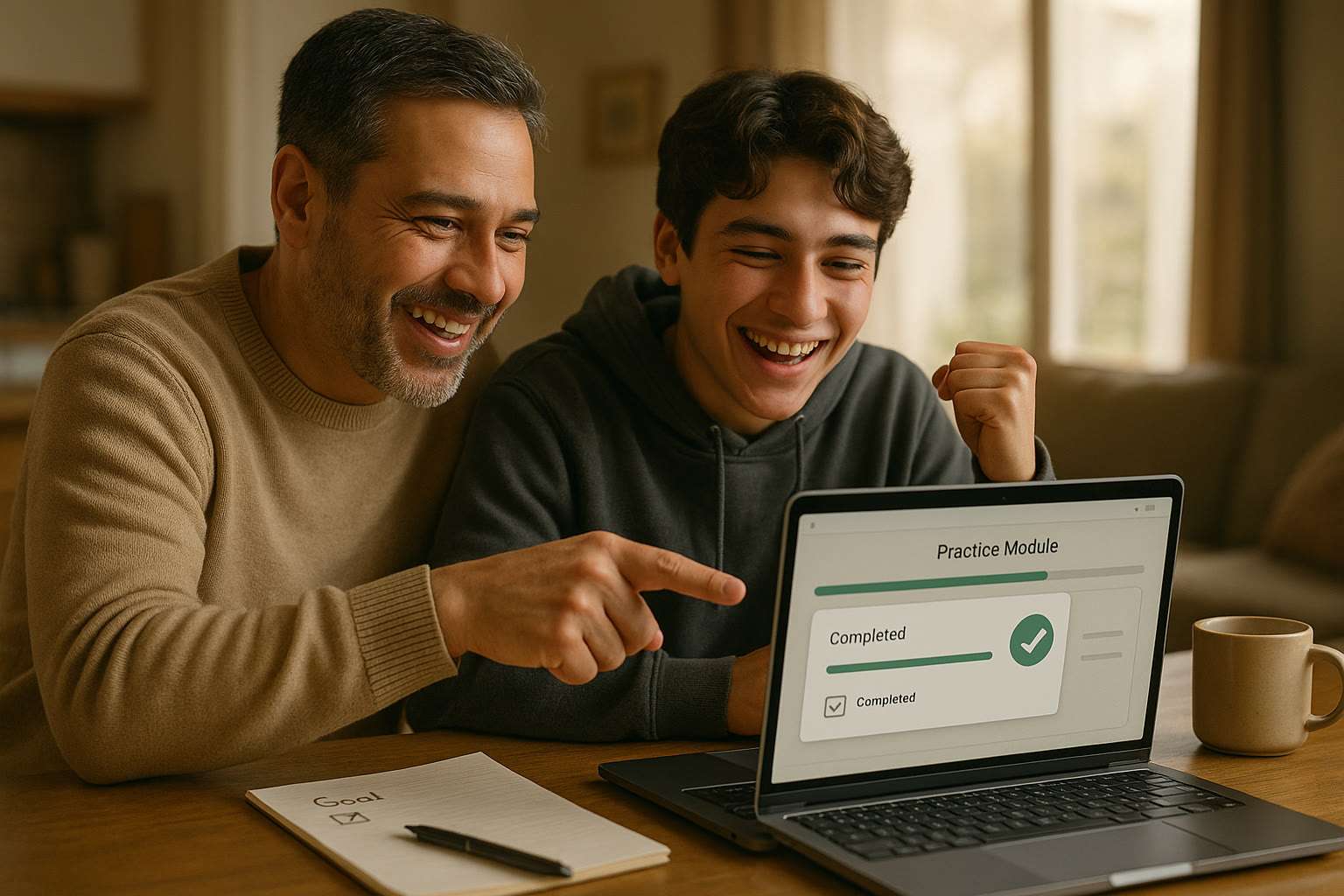Why ‘No Nagging’ Doesn’t Mean ‘No Support’
There’s a quiet art to encouraging teenagers: enough presence to guide, but not so much pressure that your child tunes you out. With the Digital SAT now shorter, adaptive, and a little different in feel than the paper test, the way students prepare is changing too. As a parent, you don’t need to become a drill sergeant or a test prep expert overnight. You just need a toolbox of habits, empathy, and smart strategies to help your teen build strong study ethics — the kind that last through high school and into college.

What’s different about the Digital SAT (and why it matters for habits)
First, a short orientation to the exam matters because it shapes how students should study. The Digital SAT is shorter than the old paper test and divided into two adaptive modules per section. That means practice should focus on consistent pacing, building confidence on early modules (which influence the second module’s difficulty), and steady skill development rather than endurance alone.
Why this helps parents: shorter tests reward focused, efficient practice. You can design short, predictable study windows at home that mimic the exam’s rhythm — and that’s less likely to trigger resistance than marathon cram sessions.
Set the Stage: Structure Without Control
Teens respond to structure when it feels reasonable and mutual. The goal is to create a predictable study atmosphere that they can own.
Co-create a weekly study rhythm
Invite your teen to a short planning conversation once a week. Resist scripting every minute. Instead, ask questions and offer options:
- “Which two evenings this week would you like to reserve for SAT practice?”
- “Would you like 45 minutes of practice followed by 15 minutes of review, or two 30-minute sessions?”
- “Do you prefer to do Math first or Reading when you’re fresh?”
Giving choice reduces friction and builds ownership. When they pick the plan, they’re more likely to follow it — and you’ve avoided the nagging conversation about “when” it will happen.
Create simple guardrails — predictable, flexible, humane
Guardrails are small boundaries that keep things on track without being authoritarian. Examples:
- Designate a homework/study spot (cafeteria table during the weekend, kitchen island on weekdays, or their bedroom desk).
- Set a phone policy for study blocks (e.g., phone in a basket or Do Not Disturb on during 30–60 minute sessions).
- Keep required materials on hand: a charged device (with the Bluebook app practice), scratch paper, a pencil, and a water bottle.
The Communication Playbook: Say Less, Ask More
Conversations are where nagging often starts — usually because a parent is anxious and wants to fix things. You can channel that energy into questions that prompt reflection, planning, and action from your teen.
Questions that open doors (instead of shutting them)
- “What part of your practice felt good today?”
- “Which question types are taking the most time?”
- “If you could make one change to your study plan, what would it be?”
These prompts encourage metacognition — thinking about thinking — which is a higher-order skill closely tied to improved studying. When students reflect, they’re more likely to adjust habits themselves rather than wait for a parent to tell them what to do.
Use specific, gentle feedback
Instead of general statements like “You need to study more,” try specifics with empathy: “I noticed the practice tests don’t include many science passages; you’ve been stronger in math lately. Want to rotate in more reading this week?” Specific observations are less likely to escalate into argument and more likely to produce collaboration.
Motivation That Sticks: Intrinsic Over External
Grades and rewards have their place, but the most resilient study ethic is built on internal motivation: curiosity, mastery, and autonomy. Parents can help cultivate this mindset.
Help them set meaningful, bite-sized goals
Big goals (college acceptance) are important, but they’re distant. Tiny wins are immediate and reinforcing. Try helping your teen set goals like:
- Improve accuracy on algebra word problems by 10% in two weeks.
- Finish four full practice modules this month with a 10-minute review after each.
- Reduce time spent on sentence completion by 15 seconds per question over four sessions.
Celebrate the small wins privately and specifically: “I noticed you shaved 20 seconds off your average on those reading questions — that’s real progress.”
Encourage curiosity-driven practice
When students notice patterns (e.g., “I always miss inference questions”), encourage a short investigation: read one passage together, annotate the reasoning, and make a quick checklist of common traps. That turns a weakness into a detective project rather than a punishment.
Pacing, Practice, and Play: The Three Ps of Sustainable Prep
Successful preparation mixes deliberate practice with rest and occasional play. Students need repetition, but they also need variety and recovery.
Smart practice beats endless hours
- Short, focused sessions (30–50 minutes) with a single target (timing, algebra, paragraph improvements).
- Active review: correct mistakes, re-solve without looking, and summarize a strategy in two sentences.
- Weekly full practice modules to build familiarity with the adaptive cadence of the Digital SAT.
The role of practice tests
Use practice tests strategically — not just as assessments but as learning tools. After a module, review the two or three most common errors and create a tiny “action item” for the next session. This iterative loop (practice → review → target practice) builds competence quickly.
When to Step In — And When to Step Back
Knowing when to help is as important as knowing how. Your teen will need different support at different stages.
Signs to step in
- Persistent avoidance (skipping agreed practice most weeks).
- Overwhelming anxiety — sleepless nights, panic about simple practice tasks.
- Plateauing despite consistent effort and smart practice.
How to step in constructively
Bring options, not ultimatums. Offer targeted resources: a short tutoring block, a practice plan tweak, or a relaxation routine before tests. One practical option is to introduce short-term, expert help if progress stalls. Personalized tutoring — like Sparkl’s 1-on-1 guidance with tailored study plans and expert tutors — can give your teen focused feedback and the accountability boost they need, without the family stress of nagging.
Practical Tools: Routines, Rewards, and Record-Keeping
Concrete systems reduce friction. The aim is low-effort, high-impact structures.
Two-week tracking table
Use a simple table to log practice and mood — it’s evidence-based and nonjudgmental. Below is a sample layout you can adapt.
| Day | Focus (Math/Reading) | Duration | Main Outcome (e.g., accuracy, timing) | Mood / Energy |
|---|---|---|---|---|
| Mon | Math: Linear equations | 45 min | +8% accuracy | Focused |
| Tue | Reading: Short passages | 30 min | Better timing | Tired |
| Wed | Practice module (half) | 64 min | Identified inference traps | Okay |
| Thu | Target review | 30 min | Reworked mistakes | Good |
This table is a neutral record; it helps families talk about progress without emotion, and it helps teens self-monitor their growth.
Micro-rewards that don’t spoil motivation
Celebrate progress without turning study into a purely transactional activity. Simple rituals work well: a celebratory playlist after a practice module, a family dessert after a consistent week of practice, or extra screen time earned through meeting a study goal. Keep rewards modest and tied to effort rather than scores.
Mindset Matters: Encouraging Resilience and Reflection
Tests measure performance on a given day. What matters more long-term is learning how to recover from setbacks.
Normalize mistakes as fuel
Shift the family narrative from “I failed” to “I learned.” When your teen misses a question, treat it as data. Ask: “What did that question teach you about how it’s worded or what to watch for next time?” Over time, this makes review automatic and less shameful.
Practice self-compassion
When anxiety spikes, model calm. Say things like: “You’ve been working steadily. One score doesn’t define your future. Let’s look at the next step together.” This tone reduces pressure and preserves the learning environment.
When External Help Fits Naturally
Sometimes the most helpful parental move is to bring in a trusted expert. You can make this suggestion collaboratively (not as punishment): “I can see you’re working hard and still feeling stuck. Would you like to try a short tutoring series to get a different perspective?”
How personalized tutoring helps — without undermining independence
Short, targeted tutoring can deliver:
- 1-on-1 guidance to correct specific misconceptions.
- Tailored study plans that focus on the smallest leverage points.
- Expert feedback and practice strategies that a parent might not know.
For example, Sparkl’s personalized tutoring matches students with expert tutors and AI-driven insights to highlight efficient study tasks. That combination can jumpstart progress and let parents step back while knowing their teen is getting focused help.
Realistic Expectations: Timing and Test Planning
Most students take the SAT in the spring of junior year and often again in the fall before college deadlines. That timeline means you can map a preparation schedule with natural milestones: skill audits, practice modules, targeted weeks, and a final review phase. Keep conversations about timelines pragmatic and flexible — and avoid panic-driven last-minute cram sessions.
Sample three-month prep rhythm
- Month 1: Diagnostic + build foundational skills (target 3 focused sessions/week).
- Month 2: Strategy and pacing (introduce full practice modules every 1–2 weeks).
- Month 3: Intensive review and test simulations (reduce volume but increase targeted fixes).
Final Thoughts: Parenting as Partnership
The best gift you can give your teen during SAT prep is consistent, compassionate partnership. That means holding space for practice, offering resources, asking curious questions instead of issuing commands, and stepping in with expert help when needed. You don’t need to be an expert in every math concept or test strategy — you just need to be a steady presence and a collaborator in a teenager’s path to mastery.
When study ethics are framed as a shared project — one that honors autonomy, celebrates small wins, and uses targeted help when needed — both parents and students find the process less stressful and more effective. If your teen could use a short, focused boost, consider exploring personalized options; a few sessions of 1-on-1 tutoring with tailored study plans (and tools that use data to show progress) can be the nudge that turns good intentions into sustainable habits.

Parting tips you can try tonight
- Ask one open question about their study today and listen for five minutes.
- Set a 30-minute “focused study” block and put phones away in a basket.
- Log one practice result in a simple table — just one data point is progress.
- Consider a short run of targeted tutoring if your teen’s motivation or scores plateau.
Parenting through the Digital SAT doesn’t have to be a story of commands and conflict. With gentle structure, curious conversations, micro-routines, and the right occasional help, you can guide your teen toward study habits that are calmer, more effective, and lasting. You’ll be surprised how quickly small changes — fewer lectures, more listening — lead to big results.
Ready to take one small step together? Pick one tip from this list and try it tonight. You’ll be building not only SAT readiness but a lifelong study ethic — one that will serve your child well beyond test day.















No Comments
Leave a comment Cancel